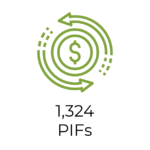Split-interest gifting has long been a staple of charitable tax planning for affluent individuals, where assets are “split” between individual beneficiaries (e.g., the donor themselves or their family members) and charitable beneficiaries. At its core, the appeal of such split-interest vehicles – particularly the ‘charitable remainder’ type – is the opportunity to claim a current tax deduction now, for a donation that can still generate income for the desired income beneficiaries in the years to come… paired with a remainder that only goes to the charity in the potentially-distant future.
The caveat, though, is that the charitable tax deduction for a charitable remainder trust and similar split-interest vehicles is determined by calculating the present value of the income interest that will be left to non-charitable beneficiaries, and subtracting that value from the upfront contribution to determine the value of the remainder. Which means the lower the interest rate, the higher the value of the non-charitable income interest, and the lower the value of the upfront charitable deduction. Which has diminished the desire to establish CRTs and other split-interest vehicles in the current low-rate environment.
However, Pooled Income Funds (PIFs) operate under slightly different rules, which can make them somewhat more appealing for split-interest giving at low yields. Functionally, PIFs are similar to CRTs, in providing an income interest to some non-charitable individuals (e.g., the donor or their family members) and the remainder to a charity. However, while CRTs typically pay out a fixed stated dollar amount or percentage of the trust, PIFs are assumed to pay out whatever their income actually will be (based on whatever their returns have been for the preceding 3 years). Which means when interest rates and projected returns are low, so too is the assumed payout rate from the PIF… allowing for a larger charitable deduction for the split-interest gift (albeit at a ‘cost’ of not necessarily generating as much income for the income beneficiaries).
For new Pooled Income Funds that have been formed, though, there is no 3-year history to determine an assumed return, and as a result the Treasury Regulations state that new PIFs are expected to use an assumed rate of the IRS 7520 rates reduced by 1%... producing an even lower interest rate assumption in the current environment, and an even higher charitable deduction. Except to the extent that the new PIF – or NPIF – actually earns a higher return in the future, it can pay out a higher rate to its income beneficiaries, even after “locking in” the charitable deduction at the initial lower-interest-rate assumption, allowing for the best of both worlds (a favorable potentially-higher payout rate to income beneficiaries and a favorable lower-interest-rate assumption for the charitable tax deduction)!
In fact, some charities are now establishing NPIFs on a rolling basis specifically to allow a steady flow of new donors to take advantage of the new rules for more favorable charitable tax deductions. And are incorporating other more-flexible provisions into their PIF documents to further attract donors to participate (for which the sponsoring charitable institution hopes to be the charitable remainder).
Unfortunately, though, because NPIFs are so ‘new’ themselves, there is no centralized directory of sponsoring charities and opportunities, requiring those interested to explore with their own charities of choice (and the associated Planned Giving Departments). Nonetheless, giving the substantial additional tax benefits that may be available, those who have an interest in split-interest charitable giving (e.g., via a Charitable Remainder Trust) should at least explore whether their charity of choice may be sponsoring a New Pooled Income Fund to use or a better charitable tax deduction instead!?
Read More...





 Welcome back to the 232nd episode of the Financial Advisor Success Podcast!
Welcome back to the 232nd episode of the Financial Advisor Success Podcast!




